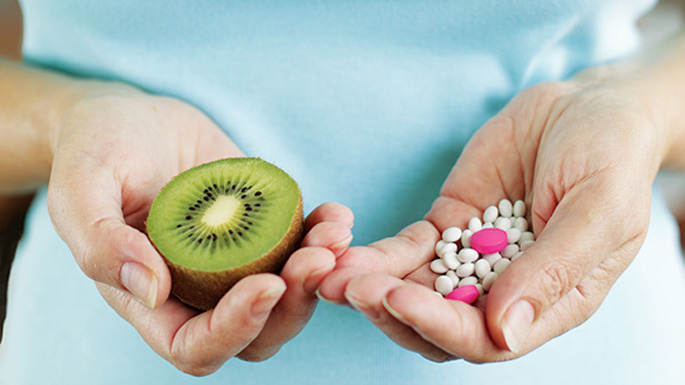Nutritional deficiencies are an unfortunate reality in our hectic urban existence. As a result, falling back on supplements has become the most natural thing to do. Vinoth Kumar tells you what to look out for before zeroing on those supplements.
Our bodies require a healthy, balanced diet filled with fresh, whole foods for survival. But in reality, it’s practically not possible to get optimal levels of nutrients through food alone. What we can get is basic amount of nutrition to keep us alive, but not the actual amount of nutrition to keep us healthy. That is where supplements come in to act as a support against nutritional deficiencies in addition to boosting our cells to perform its duties efficiently.

Understand your supplements
Vitamins, minerals, enzymes etc., are some of the most common components that go on to making
a supplement table. Let’s understand how to identify the right ones for us.
Vitamins are micronutrients and co-enzymes that are essential to life. Vitamins are involved in metabolism and the biochemical processes that release energy.
Vitamins are divided into four fat-soluble type (A, D, E & K) & nine water-soluble types
(eight B vitamins & Vitamin C). Most Vitamin supplements that are available in the market are synthetic vitamin supplements. This can be easily identified by reading the label. When the word “Dl” would appear before an ingredient, it can be considered a synthetic version of Vitamin. For example, Vitamin E: dl–Alpha tocopherol; on the other hand, if it is written as Biotin: d-Biotin, it means it is a natural version fom a plant-based extract or natural source.

Minerals are primarily stored in the bone and muscle tissue and, among other things, are basically needed to maintain chemical balance of the body's systems.
Minerals are normally natural, but where one cannot use the natural source of minerals directly, mineral supplements are recommended. Normally, mineral supplements should be in Chelated form. (Chelated: Minerals formulated to an amino acid or other organic component so that the two do not disassociate in the digestive system.)
Anti-oxidants are a group of vitamins, minerals and enzymes that help fight free radicals that can cause damage to living cells.
Look for anti-oxidant supplements from natural plant-based extracts such as green tea extract, goji berry extract etc. Try and avoid synthetic anti-oxidant supplements such as hydroxyanisole, butylated hydroxytoluene, propyl gallate etc.
Enzymes by definition are catalysts that enable molecules to be changed from one form into another. Digestive enzymes enable food to be broken down into nutrients in our bodies to produce energy, and repair and maintain our physical structure and function.
Look for plant of food-based enzymes–for eg. papaya, pineapple, bee pollen and fermented vegetable extracts. Look for the same in your supplement label that you plan to purchase and try and avoid lab- based enzymes derived from animal
tissues etc.

How to choose a good supplement?
• The most important thing to keep in mind when it comes to choosing a supplement is to read the label.
• A good supplement should have clear labelling with all the ingredients mentioned in detail (including any fillers or coating etc).
• For example, a good multi-vitamin should provide you nearly 100 per cent of the dietary value of almost all nutrients. Unclear labelling only means that the nutrients are not present in a sufficient quantity and that it may be of no good.
• The amount of nutrient per serving should be mentioned on the label whether it is a vitamin supplement or a protein powder.

What to watch out for
• Avoid products that have ingredients listed in ‘proprietary blend’. Many companies use this term to avoid giving an exact break up or the amount of ingredient per serving in their supplement. This is backed by a legitimate argument that its a way to prevent competitors from mimicking their product using the same formulation or making a better one. However, most of the times proprietary blend may be used as a way of fooling consumers by not mentioning about the active ingredients. They get away by adding ingredients in small doses which are therapeutically ineffective. That way the company can cut corners and you end up shelling out money for nothing.
• The label should also ensure a marking for quality assurance. A standardised product should have a USP certification or NSF label. These certification make sure that the product is tested by U.S. Pharmacopeial convention or NSF International. They make sure that the claims are authentic, whether the ingredients mentioned do exist and that there is no contamination.
• You can also verify a good product by checking the Food and Drug Administration (FDA) website or NIH office of Dietary supplements to see if the product is safe for consumption. They provide a lot of information on the safety information, labelling, warnings and evaluation.
• Also look for the expiry date which should be printed on the side or bottom of the container.
If the supplement doesn’t have the expiry date, it is better to put it back on the shelf.
• You can make out if a product is fake by paying attention to the label. A misspelling or grammatical error in the brand name is usually a sign that the product is unsafe.
• You may be tempted to buy supplements which are priced lower. But if a supplement is priced unusually low, then there has to be something suspicious about it. Checking the label for the detailed ingredient list should help you determine whether the product is good or not.
• Always go for a reputable brand to ensure supplement safety as opposed to generic brands which might have not undergone the safety checks.
• It is also important to know the source of the supplement. Make sure you always buy supplements from authorised distributors. When you buy a supplement, you can verify if the manufacturer has a Certificate of Analysis (COA) or if the product is manufactured at Good Manufacturing Practices (GMP).
• If you are buying products online, you need to check if the website is giving a complete factsheet of ingredients. Avoid buying product if the website doesn't give a clear nutrition label or has only key ingredients mentioned.
• A little research before buying a supplement goes a long way. Try reading up about the company background or ask around on the internet. If a product has been on the market for a few years then it would also have probably gained some reputation and feedback from other users.
With due necessary diligence, one needs to understand how the body is reacting to the supplementation. By far the best way to monitor this is to identify the nutrient deficiencies, select the right supplements and after persistent use of a particular product for a designated time, do a blood test, to see if there has been an improvement in the blood parameters.
The writer is Co-Founder & Director of PureNutrition


